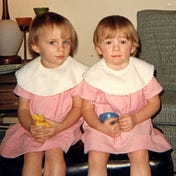Lost in Transference: A Psychoanalytic Journey Published Weekly
I'm a storyteller at heart, creating worlds in fiction and art. You know how in a story you have a beginning, middle, and end? And the plot winds its way through conflict and resolution? And the end answers important questions?
Well, none of that will happen here. That's my other profile.
About These Essays
I’m a transgressive writer who gleefully develops coercive challenges for the reader. My essays may have a similar sensibility. They’re unflinching, with no redemptive arc. But that's like all my writing, which pursues jouissance.
My childhood was filled with mental illness, violence, sexual abuse, and brilliance. The visceral details from my experiences aren't the metaphors of a conventional narrative. They're my metonymic associations, and I imagine one day, they'll simply stop.
You're here to make your own associations from my fragmented narrative. But really, that's the story of every story.
About Psychoanalysis
I like complexity, uncertainty, and possibility. This is why I embrace psychoanalysis. This is where I can create a future. A psychologist objectifies the patient to produce knowledge and starts from a position of "this fits somewhere." A psychoanalyst is a reader of a story and approaches a patient as "this is unknown."
David is a psychotherapist who is also a candidate at a psychoanalytic institute in the U.S. that considers various frameworks, such as object relations, self-psychology, and relational theories.
On the other hand, I'm fond of the original drive theory. I love the language, the investigative fervor, and the scientific hubris early 20th century analysts brought to the talking cure. Good times. But I suppose I value most those forms of psychoanalysis that destabilize the subject: Lacanian and relational.
David and I meet in person four times each week, and I'm getting used to the couch.
* To the extent that we define knowing as our capacity to think intentionally about something, we literally do not know whatever meanings we cannot say. - Donnel Stern in Unformulated Experience
-----
The photo above is my family in 1973. My mother, oldest sister, and father are in the back row. My twin sister, me, and my brother are in the front.
The profile avatar shows my twin sister on the left and me on the right in 1967.
